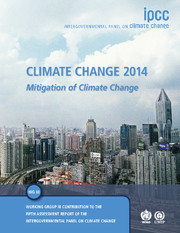 Climate Change 2014: Mitigation of Climate Change
Climate Change 2014: Mitigation of Climate Change Book contents
- Frontmatter
- Foreword, Preface, Dedication and In Memoriam
- Contents
- Summary for Policymakers
- Technical Summary
- Chapters
- Chapter 1 Introductory Chapter
- Chapter 2 Integrated Risk and Uncertainty Assessment of Climate Change Response Policies
- Chapter 3 Social, Economic, and Ethical Concepts and Methods
- Chapter 4 Sustainable Development and Equity
- Chapter 5 Drivers, Trends and Mitigation
- Chapter 6 Assessing Transformation Pathways
- Chapter 7 Energy Systems
- Chapter 8 Transport
- Chapter 9 Buildings
- Chapter 10 Industry
- Chapter 11 Agriculture, Forestry and Other Land Use (AFOLU)
- Chapter 12 Human Settlements, Infrastructure, and Spatial Planning
- Chapter 13 International Cooperation: Agreements & Instruments
- Chapter 14 Regional Development and Cooperation
- Chapter 15 National and Sub-national Policies and Institutions
- Chapter 16 Cross-cutting Investment and Finance Issues
- Annexes
- Index
Chapter 13 - International Cooperation: Agreements & Instruments
from Chapters
Published online by Cambridge University Press: 05 February 2015
- Frontmatter
- Foreword, Preface, Dedication and In Memoriam
- Contents
- Summary for Policymakers
- Technical Summary
- Chapters
- Chapter 1 Introductory Chapter
- Chapter 2 Integrated Risk and Uncertainty Assessment of Climate Change Response Policies
- Chapter 3 Social, Economic, and Ethical Concepts and Methods
- Chapter 4 Sustainable Development and Equity
- Chapter 5 Drivers, Trends and Mitigation
- Chapter 6 Assessing Transformation Pathways
- Chapter 7 Energy Systems
- Chapter 8 Transport
- Chapter 9 Buildings
- Chapter 10 Industry
- Chapter 11 Agriculture, Forestry and Other Land Use (AFOLU)
- Chapter 12 Human Settlements, Infrastructure, and Spatial Planning
- Chapter 13 International Cooperation: Agreements & Instruments
- Chapter 14 Regional Development and Cooperation
- Chapter 15 National and Sub-national Policies and Institutions
- Chapter 16 Cross-cutting Investment and Finance Issues
- Annexes
- Index
Summary
Introduction
Due to global mixing of greenhouse gases (GHGs) in the atmosphere, anthropogenic climate change is a global commons problem. For this reason, international cooperation is necessary to achieve significant progress in mitigating climate change. Drawing on published research, this chapter critically examines and evaluates the ways in which agreements and instruments for international cooperation have been and can be organized and implemented. The retrospective analysis of international cooperation in the chapter quantifies and discusses what has been achieved to date, and surveys the literature on explanations of successes and failures.
The scope of the chapter is defined by the range of feasible international agreements and other policy instruments for cooperation on climate-change mitigation and adaptation. The disciplinary scope spans the social sciences of economics, political science, international relations, law, public policy, psychology, and sociology; relevant humanities, including history and philosophy; and—where relevant to the discussion—the natural sciences. Where appropriate, the chapter synthesizes literature that utilizes econometric modelling, integrated modelling, game theory, comparative case studies, legal analysis, and political analysis. This chapter focuses on research and policy developments since the Fourth Assessment Report (AR4) of the Intergovernmental Panel on Climate Change (IPCC, 2007).
Framing concepts for an assessment of means for international cooperation
This section introduces the concept of a global commons problem to frame the challenge of international cooperation on climate change, principles for designing effective international climate policy, and criteria for evaluating these policies.
13.2.1 Framing concepts and principles
13.2.1.1 The global commons and international climate cooperation
Climate change is a global commons problem, meaning reduction in emissions by any jurisdiction carries an economic cost, but the benefits (in the form of reduced damages from climate change) are spread around the world—although unevenly—due to GHG emissions mixing globally in the atmosphere. Mitigation of climate change is non-excludable, meaning it is difficult to exclude any individual or institution from the shared global benefits of emissions reduction undertaken by any localized actor.
- Type
- Chapter
- Information
- Climate Change 2014: Mitigation of Climate ChangeWorking Group III Contribution to the IPCC Fifth Assessment Report, pp. 1001 - 1082Publisher: Cambridge University PressPrint publication year: 2015
- 2
- Cited by


